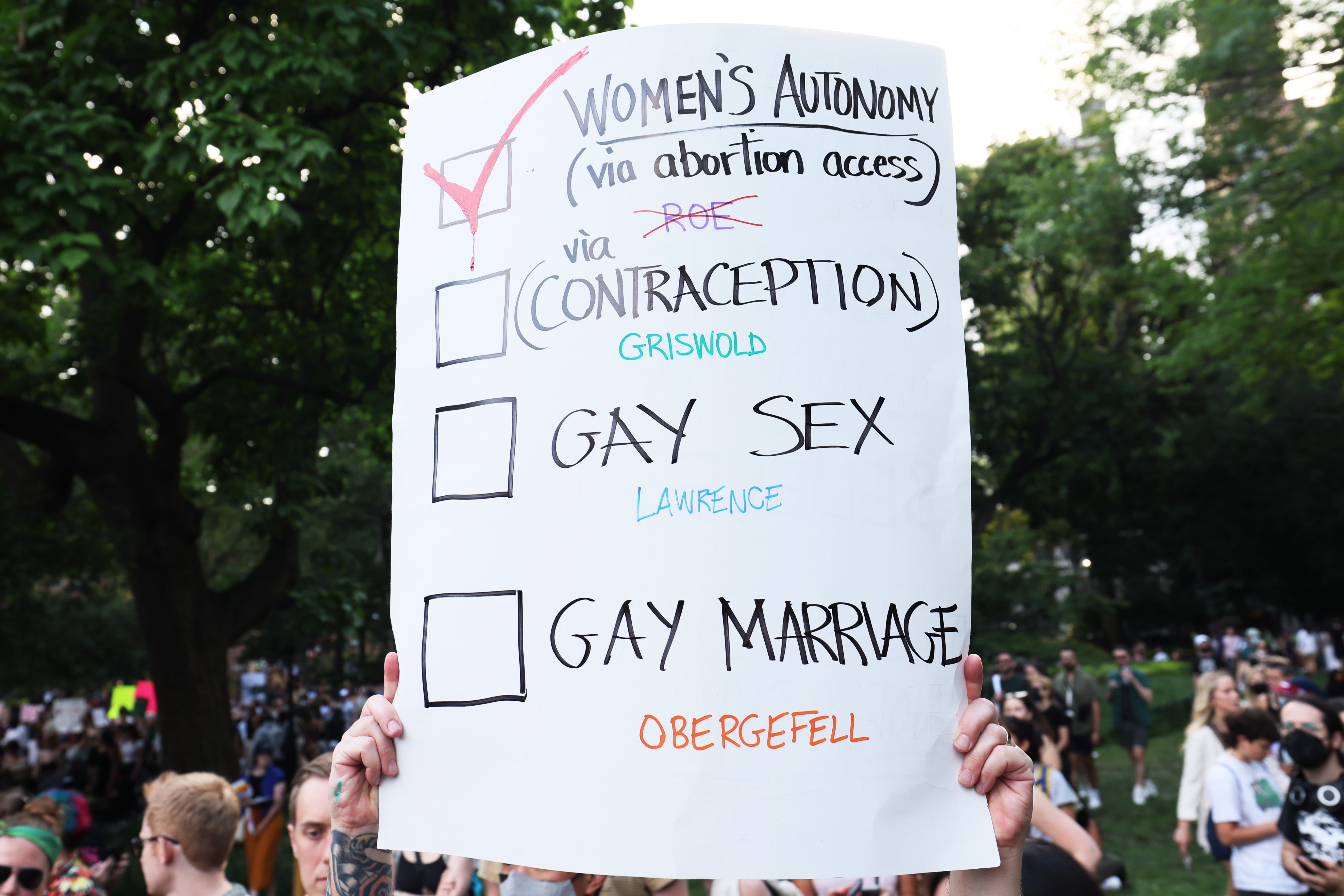
One month after US Supreme Court Justice Clarence Thomas suggested that the conservative majority could revisit critical decisions that affirmed a right to contraception and same-sex couples’ freedom to marry, Democratic members of Congress are advancing legislation to ensure those protections in law.
This week, the House of Representatives will vote on a pair of bills – the Right to Contraception Act and the Respect for Marriage Act – anticipating state-level attempts to undermine marriage equality and access to birth control after the Supreme Court struck down Roe v Wade on 24 June.
Both measures were debated in the House Rule Committee on 18 July. Several House Republicans have already signalled they will not support the bills. Votes are expected in the full House later this week.
After the Supreme Court dissolved the right to abortion care in Dobbs v Jackson Women’s Health Organization, Republican state lawmakers across the US enacted severe anti-abortion laws that were previously deemed unconstitutional, while conservative legal groups and right-wing Christian lobbyists – which have spent years challenging LGBT+ rights and reproductive healthcare measures – seek to grow their influence in state legislatures.
Without explicit federal protections, Democratic lawmakers have feared that – like abortion – access to contraception and the recognition of same-sex marriages could depend on protections within individual states.
The 1973 decision in Roe v Wade relied on protections granted in the Constitution’s 14th Amendment, which prohibits states from “[depriving] any person of life, liberty, or property, without due process of law” – granting so-called “unenumerated” rights not explicitly mentioned in the document.
A concurring opinion in the Dobbs case from Justice Thomas suggested that the court “reconsider all of this court’s substantive due process precedents” – including landmark cases involving contraception, same-sex marriages and gay sex.
“Because any substantive due process decision is ‘demonstrably erroneous’... we have a duty to ‘correct the error’ established in those precedents,” Justice Thomas wrote. “The question would remain whether other constitutional provisions guarantee the myriad rights that our substantive due process cases have generated.”
Those precedents include 1965’s Griswold v Connecticut, which ruled that states had no right to ban contraception, and 2015’s Obergefell v Hodges, which ruled that same-sex couples could legally marry. A decision in 2003’s Lawrence v Texas struck down laws banning same-sex sex.
House Majority Leader Steny Hoyer said that the House “will not sit back and allow extremist Republicans and their judicial appointees to limit Americans’ access to contraception.”
“American women deserve to be able to make decisions about their own bodies and their own lives, including whether to become pregnant and have children,” he said in a statement. “That is a basic human right that House Democrats will defend with all our strength.”
In his support for advancing the Respect for Marriage Act, he said the high court’s “extremist and precedent-ignoring decision in Dobbs v Jackson has shown us why it is critical to ensure that federal law protects those whose constitutional rights might be threatened by Republican-controlled state legislatures.”

On Monday, Democratic US Senator Dick Durbin told the Senate “I don’t think this court’s going to stop with overturning Roe.”
He suggested that Senate Democrats would move forward with parallel efforts to protect marriage equality and contraception though it is unclear whether there are enough votes in the evenly divided chamber, repeatedly hamstrung by Republican obstruction.
The White House, in a statement on Monday, urged passage of the Right to Contraception Act, warning that the outcome of the Dobbs case “has already had devastating implications for women’s health and public health.”
“It will continue to have far-reaching consequences that highlight the need to protect not only access to abortion, but also access to reproductive health care services more broadly,” according to the White House Office of Management and Budget. “Access to the full range of reproductive health care services – including all FDA-approved forms of contraception – is critical for millions of Americans, especially those who live in states that are banning or severely restricting abortion care.”
In his opinion in the Dobbs case, Justice Samuel Alito referred to an “unfounded fear” that rights to marriage equality and contraception would be under threat, arguing that the decision only concerned the constitutional protections for abortion.
But anti-abortion state lawmakers and anti-abortion groups that have sought to outlaw abortion from the moment of coneption could also lead challenges to emergency contraception or intrauterine devices, or IUDs, according to abortion rights proponents and legal analysts.
Three of the justices who objected to the Obergefell decision on marriage equality also are still on the court.
Senator Ted Cruz also recently suggested that the Obergefell decision was “clearly wrong when it was decided.” And the Texas Republican Party’s recently adopted official platform opposes “homosexual marriage, regardless of state of origin.”
State statutes that prohibit same-sex marriages remain on the books In more than 30 states, despite the Obergefell decision that ruled them unconstitutional.
“We can’t take anything for granted,” according to a statement from Democratic US Rep Chris Pappas, the state’s first openly gay member of Congress. “I hope my colleagues on both sides of the aisle will listen to their constituents and defend every individuals’ freedom to be themselves, love whom they want to love, and marry the person of their choosing.”







